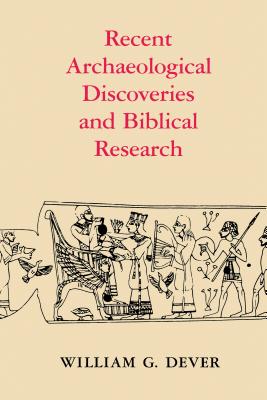Archaeology and Bible--two simple terms, often used together, understood by everybody. But are they understood properly? If so, why are both subject to such controversy? And what can archaeology contribute to our understanding of the Bible? These are the problems addressed by Professor Dever in this book.
Dever first looks at the nature and recent development of both archaeology and Biblical studies, and then lays the groundwork for a new a productive relationship between these two disciplines. His "case studies" are three eras in Israelite history: the period of settlement in Canaan, the period of the United Monarchy, and the period of religious development, chiefly during the Divided Monarchy. In each case Dever explores by means of recent discoveries what archaeology, couples with textual study, can contribute to the illumination of the life and times of ancient Israel.
Given the flood of new information that has come from recent archaeological discoveries, Dever has chosen to draw evidence largely from excavations and surveys done in Israel in the last ten years--many still unpublished--concerning archaeology and the Old Testament.
Dever’s work not only brings the reader up to date on recent archaeological discoveries as they pertain to the Hebrew Bible, but indeed goes further in offering an original interpretation of the relationship between the study of the Bible and the uncovering of the material culture of the ancient Near East. Extensive notes, plus the use of much new and/or unpublished data, will make the volume useful to graduate students and professors in the fields of Biblical studies and Syro-Palestinian archaeology, and the seminarians, pastors, rabbis, and others. This book provides stimulating, provocative, and often controversial reading as well as a compendium of valuable insights and marginalia that symbolizes the state of the art of Biblical archaeology today.
| FindBook |
有 1 項符合
Recent Archaeological Discoveries and Biblical Research的圖書 |
 |
Recent Archaeological Discoveries and Biblical Research 作者:Dever 出版社:University of Washington Press 出版日期:1993-03-01 語言:英文 規格:平裝 / 200頁 / 21.6 x 15.2 x 1.5 cm / 普通級/ 初版 |
| 圖書館借閱 |
| 國家圖書館 | 全國圖書書目資訊網 | 國立公共資訊圖書館 | 電子書服務平台 | MetaCat 跨館整合查詢 |
| 臺北市立圖書館 | 新北市立圖書館 | 基隆市公共圖書館 | 桃園市立圖書館 | 新竹縣公共圖書館 |
| 苗栗縣立圖書館 | 臺中市立圖書館 | 彰化縣公共圖書館 | 南投縣文化局 | 雲林縣公共圖書館 |
| 嘉義縣圖書館 | 臺南市立圖書館 | 高雄市立圖書館 | 屏東縣公共圖書館 | 宜蘭縣公共圖書館 |
| 花蓮縣文化局 | 臺東縣文化處 |
|
|
圖書介紹 - 資料來源:博客來 評分:
圖書名稱:Recent Archaeological Discoveries and Biblical Research
內容簡介
|










 2025【精選作文範例】國文(作文)[速成+歷年試題](不動產經紀人)](https://media.taaze.tw/showLargeImage.html?sc=14100120564)
